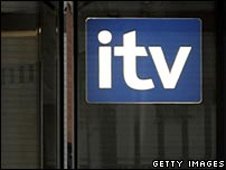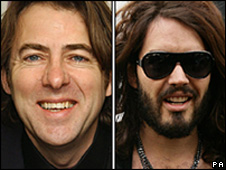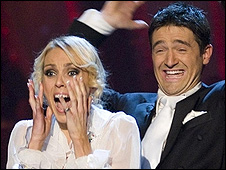But these financial penalties seemed mild
 |
|
ITV
plans to reduce its regional
news services |
compared with the collapse of the ITV share
price (exacerbated by a Competition Commission
order that BSkyB must reduce its 17% stake) and
its economic prospects.
With
advertising set to go from bad to worse, ITV
also had to cope with the loss of its analogue
"subsidy" to provide public-service broadcasting
(PSB) - a problem also afflicting Channel 4.
ITV's pleas of
poverty to Ofcom reaped dividends when the
regulator agreed to a reduction in its PSB
obligations, including a cut in its regional
news staff.
Other
broadcasters had to pay up too - licence-payers
coughed up more than ?500,000 for the earlier
phone failures at the BBC, including ?95,000 at
the end of the year for several offences
committed in 2006.
'Top-slicing'
This was an
unwelcome surprise, coming after the phone
problems at Strictly Come Dancing and the
Russell Brand show - on which Ofcom is still
pondering - though the good news was that no
fine was imposed on the BBC for the misnaming of
the Blue Peter cat.
Licence-payers' money was never far from the
headlines. Indeed, as a result of the "crises",
many people threatened to stop paying the
licence fee at all.
The phrase
"top-slicing" gained currency as Ofcom floated
the idea that some of the licence money should
be taken from the BBC and given to Channel 4, to
help it out of its own funding problems.
 |
 The BBC has a guaranteed income
of almost ?4bn a year and that
looks more than healthy to a
commercial media sector that has
no idea how much revenue it will
earn next year or the year
after.
The BBC has a guaranteed income
of almost ?4bn a year and that
looks more than healthy to a
commercial media sector that has
no idea how much revenue it will
earn next year or the year
after.

|
As its
economic prospects worsened, Channel 4 had to
abandon its plans - and an Ofcom broadcasting
licence - to launch a raft of digital radio
stations.
This
reinforced a feeling of gloom over the future of
digital radio, following the closure of several
other digital stations.
The
"top-slicing" plan was fiercely opposed by the
BBC, as was a later suggestion that Channel 4
should merge with BBC Worldwide, the commercial
subsidiary that sells programmes and DVDs around
the world.
The BBC
pointed out that it was already having to cut
costs after the government awarded it a lower
licence-fee increase than asked for.
But the BBC
still has a guaranteed income of almost ?4
billion a year and that looks more than healthy
to a commercial media sector that has no idea
how much revenue it will earn next year or the
year after.
Digital
Britain
Throughout
2008, commercial TV, radio, newspaper and
magazine groups hardened their opposition to the
BBC's business and editorial expansion, gaining
support from MPs and in some cases, from
regulators.
Towards the
end of the year, the BBC Trust turned down plans
for the BBC to launch new video services on its
local websites, saying this would damage local
newspapers' own web services.
Some questions
on how public-service broadcasting is to be
funded in future will come nearer to being
resolved in the new year, when Lord Carter, the
new minister for broadcasting and
telecommunications, publishes a report on
Digital Britain.
He believes
that at a time of crisis in financial services,
the UK's highly-regarded creative sector can
help revive the economy. |




